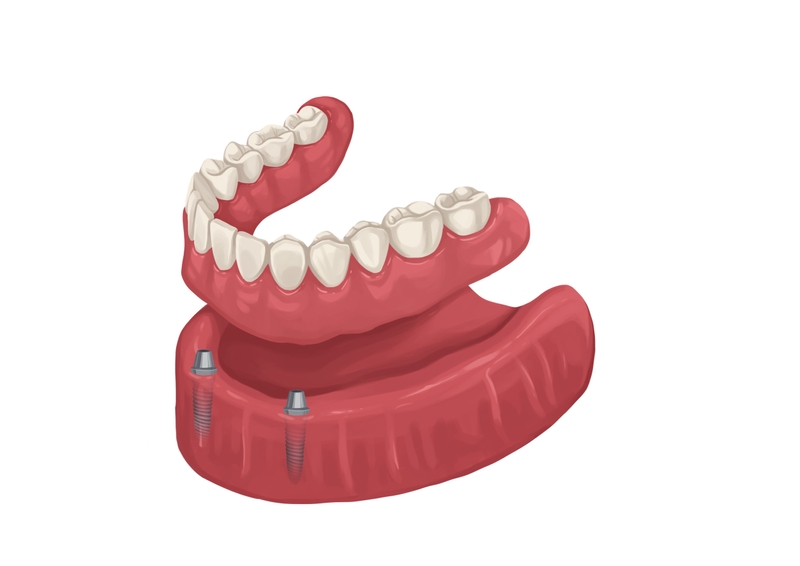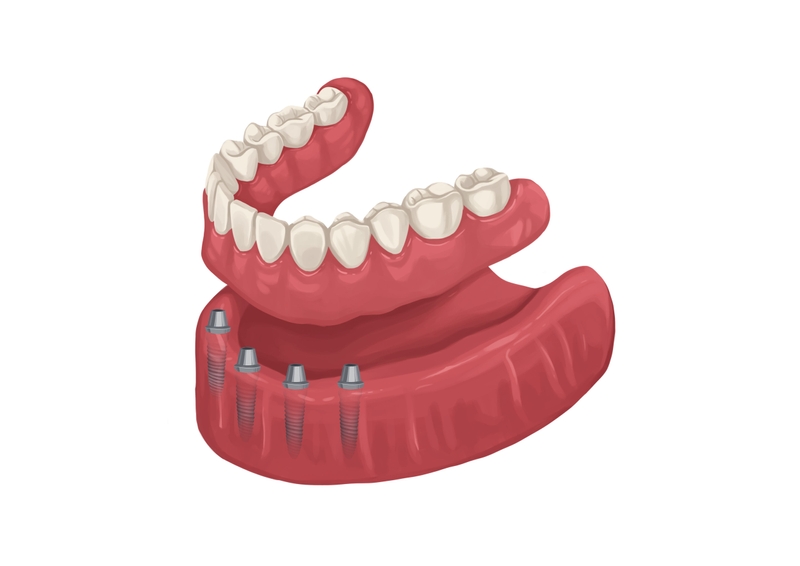- Snap-in dentures or implant dentures combine the advantages of dental implants and dentures. They are attached to two or four rods that are inserted into the jawbone.
- Snap-in dentures are suitable for the upper and lower dental arches, but you have to remove them at night and for cleaning. This option is suitable for patients with moderate or no bone loss who do not smoke and do not suffer from TMJ syndrome or gum disease.
- Snap-in dentures prevent bone loss and improve facial structure. They also provide comfort when speaking and eating and do not require bone grafting or sinus lifting.
Redefine your smile, redesign your life. Use Authority Dental to book an appointment for cheap dental implants nearby. It's fast, easy and trustworthy.
Are you considering snap-in dentures as a tooth replacement option? Here's everything you need to know.
What are snap on dentures?

Picture by Authority Dental under CC 2.0 license
Denture implants are a removable tooth restoration solution. They can be full or partial. Implants are inserted into the jawbone and a row of teeth in the form of dentures “snaps” onto the rods. Other names of clip in dentures include implant retained dentures and snap-in or snap-on overdentures.
This technique takes advantage of dental implants' biggest benefits, i.e. their strength and durability.
For full mouth restorations, the denture is usually mounted on 2-rods. Depending on the patient’s mouth condition, the dentist might decide to increase the number to 4. This helps make the denture more stable. Snap-on dentures are suitable for the upper and lower arches. The false teeth must be removed at night and for cleaning.
Snap-in denture candidate profile

Picture by Authority Dental under CC 2.0 license
The dental implant procedure has requirements that must be met. It is part of getting snap-on dentures. Here is a general candidate overview:
missing or severely damaged teeth,
moderate or no bone loss,
non-smoker,
no TMJ syndrome or gum disease, and
readiness to avoid hard foods.
Implant-retained dentures are placed on a smaller amount of rods than permanent implant solutions. You may even get away with mini implants. This makes the whole thing more affordable, a little bone loss is not a huge problem, and you may get away without bone grafting or sinus lifting.
Smoking and dental implants, however, don’t mix. If you are a smoker you must be willing to quit, at least during and for a few months after the procedure, while recovery takes place. Cigarettes are a common reason for implant loss.
Patients with TMJ syndrome usually prefer to keep their teeth in at night and have a sturdier attachment. This is why permanent solutions may be better for them. The same applies to those who enjoy steaks or other food that is difficult to chew and don’t want to commit to a soft food diet.
And lastly, any solution with dentures and implants requires a healthy mouth. The patient has to undergo excellent aftercare but might also have to be prepared for treatment beforehand. Periodontitis must be healed before implantation takes place. What’s more, if you have a history of gum disease, you may be more prone to dental implant infections.
Implant dentures pros and cons
You should consider all snap-on dentures pros and cons before making your decision.
First of all, implant dentures help prevent bone loss and improve facial structure to make you look younger. They provide more comfort in speaking, eating, smiling, and laughing than a traditional denture. There is often no need for bone grafting or sinus lifting.
On the other hand, removable denture implants may cause sore spots and relines are needed on occasion. Despite being the most affordable implant solution for full mouth restorations, they can still be quite expensive for some patients.
Help prevent bone loss
Improve facial structure
Offer comfort in speaking, eating, smiling, and laughing
No need for bone augmentation procedures
Most affordable implant solution for full-mouth restorations
Can lead to sore spots
Relines are needed
Expensive compared to traditional dentures
Implant-retained vs. implant-supported dentures

Picture by Authority Dental under CC 2.0 license
Implant-retained (overdentures) and implant-supported (hybrid fixed) dentures may easily be confused. Either one can be a great fit for a patient who needs multiple teeth replaced or a full-mouth restoration. Here are some key differences between the two:
Implant-retained dentures
Removable solution
2 or more rods
More affordable
A little bone loss is not a contraindication
Can be mounted on mini implants
Does not fully absorb shock from biting
Has to be removed at night and for cleaning
Relines are needed
Implant-supported dentures
Fixed solution
Usually 4 rods
More expensive
Needs an adequate amount of bone
Bone grafting or sinus lifting might be necessary
Mini dental implants are not suitable for this solution
Absorbs the full force of a bite
Gives the best speaking, laughing, eating, and sneezing comfort
A patient who has undergone a little bone loss may be a good candidate for one type of implant-supported solution called the All-on-4. Still, the appliance is a fixed bridge and can only be removed by the dentist.
FAQ
How many implants are needed for dentures?
How long does it take to get implant dentures?
How to care for implant-supported dentures?
Which is better, dentures or dental implants?
It depends on your situation. A dental implant is a great solution for singular missing teeth. If you have more missing you can consider a traditional denture or one that is held up by implants.
Traditional dentures are cheaper and can be ready faster but have more running costs and need to be replaced more often. Implant-retained or implant-supported dentures are more stable, durable and provide more comfort. They can take a longer time to make, however, and are a lot more expensive.
Richard Hattaway, DDS
When a patient is transitioning from a traditional denture, 2 implants are a great option. When transitioning from natural dentition, 2 implants are not usually enough.